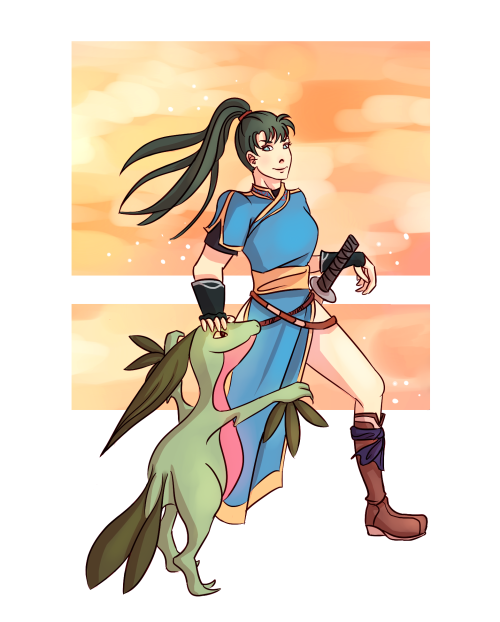we are a woven strand [Lyndis]
Jan 22, 2019 2:18:58 GMT -5
Post by WT on Jan 22, 2019 2:18:58 GMT -5
A child, told she has minutes to gather whatever she might call precious, makes decisions she might later regret. She takes what her determined mother hands her—folds money and documents into the bands of her clothing as instructed, puts her biggest coat despite the warmth and stuffs the pockets with jewelry that she doesn't know might become bribes as easily as heirlooms, reaches for her youngest sister's hand when she starts to cry—but the things she chooses, in those moments of panicked instinct, are less practical. A favorite shirt she's already starting to grow out of. Notes that the Peacekeepers will rip apart anyway when they see a language they can't read. A treasured toy or a pretty string bracelet, held close for comfort on the crowded train but impossible to pawn when that train dropped her family off to build a new life from scratch in unfamiliar dust.
In those hardest early years, struggling to piece scraps into meals and listening helplessly to her sisters cough, Marisol grew achingly familiar with the arithmetic of the desperate. If only I'd brought one more piece of jewelry nice enough to sell, she would confess to her mother on the worst evenings, or looked for a bottle of medicine, today would be that smallest bit better—but many decades have crawled and raced by since she thought her own hindsight clever enough to circumvent the fate God laid out. A lo hecho, pecho, as her mother always told her in reply. They survived with what they had, through prayer and tenacity and sheer hard work, and in the end the further time marched the more she treasured those tangible footholds for her memories. Long after she could no longer imagine Rotem's cadence or the particular shine of Sarika's hair—after she could no longer confirm so much else as memory, instead of wishful thinking or a story she made her mother tell so often that she dreamed it—she could wind her bracelet around her fingers, remember how her hands moved to weave the three strands together, and know that she never had to doubt her childhood friends' favorite colors.
Bringing it back with her felt right. It no longer quite fits around her wrist, thin these days with age but not so small as a six-year-old's, but it travels easily with her looped through the handle of her cane beside the wrist strap. It's the first spot of color in the train car when she leans the cane against a corner to free her hands for decorating; it's soft under her fingers when she takes her first breath of new air in her old home, and later that afternoon when her other hand, guiding her eyes line by line down the names on the map of market stalls, stops short at Sarika Saraswami.
District Three, reads the smaller text on the next line down. That makes sense, Marisol supposes when the initial confusion passes; her father worked with... architecture? Engineering, perhaps, certainly something the Capitol must have wanted in a place like Six or Three as they separated and throttled each economy—and Sarika was always so sharp; however her family made that journey, she must have thrived on the other side—
Marisol always prayed, always dared to hope, but the letters in their printed black certainty lift from her heart something so long settled that she only notices the weight of it in its absence.
Seventy years fill out a face and draw it back in again, change voices and fashions, blur memory. Passing one another in the street, Marisol would never recognize Sarika—but as she ducks under the blue tarp of the tent, past a dark-haired young woman settling a crystal on a silver chain around her neck on her way out, the concern that she wouldn't be able to tell her old friend from an assistant managing the stall dissipates as gently as morning fog. The woman wrapping necklaces for a pair of men at the other end of the table has thin and silvering hair, framing as many wrinkles as Marisol herself has collected over the years, but Marisol knows the warm tone of her skin and the smile in her round face as surely as her feet know their path down the hill into her river. It can only be Sarika.
As the sale finishes Marisol examines the rows of deceptively delicate-looking jewelry, smiling at each burst of green and pink and yellow amid the other colors. They're well-made pieces, and clearly arranged for display by the same skilled eye, with bold metals and bright colors shining out against the deep red backdrop. None of it surprises her, exactly, but neither is it what she would have guessed, and she can't help but wonder whether Sarika kept making jewelry after Rotem's lessons—perhaps even with Rotem, for as long as they had together after that last summer; whether this is a new hobby or old, or whether one day she put her books aside and made her living this way instead.
But she only wonders idly, not bothering to hazard any guesses. Some things, she'll still never know—but these, she can ask.
A small chorus of thanks marks the end of the transaction; as Marisol looks up the duo pulls their jackets more tightly around them, gathers their bags, and heads back into the low winter wind arm and arm. Marisol takes their place, a lightness in her step that bubbles up through her bones and into the soft smile already breaking into a grin.
"Sarika Saraswami," she says warmly, "still making beautiful things." Her mittens keep her from pulling the string bracelet loose, but she lifts her cane to show it off in the handle—still soft and still bright after all these years, a cheap little treasure more precious to her than anything for sale around them. "Do you remember Marisol? We were both smaller, the last time I saw you."
Title song is "The Breaking Light" by Vienna Teng featuring Alex Wong.

































































